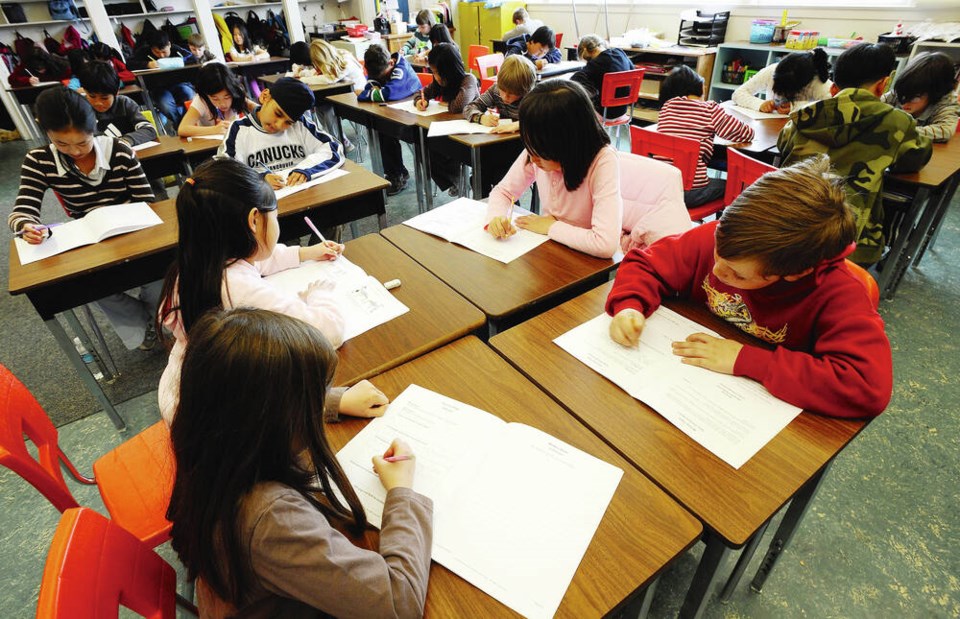The Fraser Institute’s 2022 Report, ranking British Columbia’s 870 elementary schools and 252 secondary schools, was published last month and gave me pause for thought.
I thought about the fact that, during my 37 years in public education in three B.C school districts and in New South Wales, I’d had the opportunity to visit well over 70 schools in the capacity of teacher, vice-principal, principal, district supervisor, assistant superintendent and superintendent.
I thought about visiting 20 of those schools as a member of a Ministry of Education school accreditation team.
That process saw a team of five experienced practising educators spending five days in a school asking questions about every aspect of the school’s operation and speaking, in depth, with teachers, administrators at both the school and district level.
Students and parents were also involved as the team examined both school based and provincially based academic results, as well as other valuable but not quantifiable aspects of student life beyond exam or standardized test results worth highlighting as being significant.
The accreditation team met every evening to discuss whether the school had a clear and shared focus creating a consistent direction and whether school leadership was a shared responsibility. The final report always included thoughtfully worded recommendations.
At the end of the process, a broad-based report was issued to the school first, the district and then the Ministry of Education.
There’s more but, for reasons I never understood, both the secondary and elementary accreditation processes were discontinued some years ago, leaving individual schools at the mercy of politically oriented but educationally uninformed organizations such as the Fraser Institute.
I explain all this because I cannot understand for the life of me the staggering hubris of any organization that will assess schools, then publish a “ranking” of B.C.’s elementary and secondary schools without ever going anywhere near a single school.
That’s maybe why the annual FI ranking of schools, in the eyes of many educators, parents and even some politicians, is in danger of being regarded as the FOX News of public education.
That’s not to say that the Fraser Institute school rankings are deliberately misleading. Not at all.
It’s just that, for example, the 2020 Report Card includes two types of elementary schools and lumping them together as if they were the same in the ranking process may be unintentionally disingenuous.
Here’s why: the majority of the schools (580 out of 870) enrol both Grade-4 and Grade-7 students, most of whom sit for the annual provincewide Grade 4 and Grade 7 Foundation Skills Assessment, from which the Fraser Institute’s conclusions are derived.
An additional 290 elementary schools that do not enrol Grade-7 students are also included. Those are students who attended these elementary schools, but then generally move to a middle school or junior high school after completing the highest grade (usually Grade 5 or Grade 6) that the elementary school offers.
These students participate in the Grade-7 test sittings — usually at their new middle school — a year or two after they have left their elementary school but their results are lumped in with those of their previous school.
Administrators and staff at the those schools argue that, since they cannot influence the effectiveness of learning outside their own school, they cannot be held responsible for the Grade-7 results of their former students now attending a middle school.
“To some extent, this may be true” admits the Fraser Institute in its preface to the 2022 Elementary Schools Report which is a little like FOX News admitting that it may have been mistaken “to some extent” in its original claims about election fraud.
Worse still, the Fraser Institute report completely ignores the fact that the Foundation Skills Assessment was specifically designed to provide parents, teachers, schools, school districts and the ministry with important information on how well individual students are progressing in the foundation skills of Literacy and Numeracy in terms of B.C. curricular expectations.
The FSA was never intended to provide broad and unsubstantiated assessments of a whole school, much less be a vehicle to compare that school with the other 869 elementary schools throughout B.C.
In March 2000, a report by the Canadian Centre for Policy Alternatives, an independent, non-partisan research institute, called the Fraser Institute ranking of schools “a manipulation of public opinion meant to undermine confidence in public education. It doesn’t help schools serve our kids.”
The same CCPA report went on to point out the obvious: “The Fraser Institute’s ranking does not help parents make choices and it doesn’t improve schooling … parents need information about programs and school philosophy, but this is not what the FI has in mind.”
Geoff Johnson is a former superintendent of schools.



